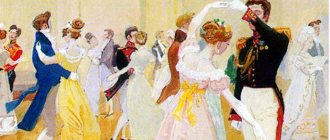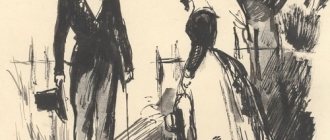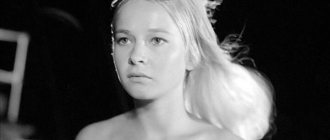Summary of “Adolescence” for a reader’s diary
Full name of the author : Tolstoy Lev Nikolaevich
Title : Boyhood
Number of pages : 160. Tolstoy Lev Nikolaevich. "Adolescence". Publishing house "Eksmo". 2021
Genre : Story
Year of writing : 1854
The material was prepared jointly with a teacher of the highest category, Kuchmina Nadezhda Vladimirovna.
Experience as a teacher of Russian language and literature - 27 years.
Main characters
Nikolai Irteniev (Nikolenka) is a kind, sympathetic fourteen-year-old teenager who is acutely experiencing his growing up.
Vladimir is Nikolenka’s older brother, who was a role model for him.
Katya and Lyuba are Nikolenka’s sisters.
Grandmother is a kind, loving woman who never recovered from the death of her daughter.
The elder Irtenyev is Nikolenka’s father, a kind, strict, but fair man.
Karl Ivanovich is Nikolenka and Volodya’s old tutor, who has sincerely become attached to the boys.
Dmitry Nekhlyudov is a young prince, a student who became Nikolenka’s best friend.
Please note that we also have:
for the most rational -
Summary of “Adolescence”
for the coolest -
Read "Boyhood" in full
Adolescence - Tolstoy Lev Nikolaevich - Page 1
Change font size:
Chapter I
Long trip
Again, two carriages are brought to the porch of Peter’s house: one is a carriage, into which Mimi, Katenka, Lyubochka, the maid and himself
clerk Yakov, on the box; the other is the britzka in which Volodya and I and the footman Vasily, recently taken from the quitrent, are traveling.
Dad, who should also come to Moscow a few days after us, stands on the porch without a hat and crosses the window of the carriage and chaise.
“Well, Christ is with you! touch it!” Yakov and the coachmen (we are driving our own) take off their hats and cross themselves. “But, but! with God blessing!" The body of the carriage and the britzka begin to bounce along the uneven road, and the birches of the large alley run past us one after another. I am not at all sad: my mental gaze is turned not to what I am leaving, but to what awaits me. As I move away from objects associated with the painful memories that have hitherto filled my imagination, these memories lose their power and are quickly replaced by a gratifying feeling of consciousness of life, full of strength, freshness and hope.
Rarely have I spent several days - I won’t say cheerfully: I was still somehow ashamed to indulge in fun - but as pleasant, as good as the four days of our journey. Before my eyes there was neither the closed door of my mother’s room, which I could not pass by without shuddering, nor the closed piano, which not only was not approached, but which they looked at with some kind of fear, nor mourning clothes (for all of us there were simple traveling dresses), nor all those things that, vividly reminding me of an irreparable loss, forced me to be wary of every manifestation of life for fear of somehow offending its memory. Here, on the contrary, constantly new picturesque places and objects stop and entertain my attention, and spring nature instills joyful feelings in my soul - contentment with the present and bright hope for the future.
Early, early in the morning, the ruthless and, as there are always people in a new position, overzealous Vasily pulls off the blanket and assures that it’s time to go and everything is ready. No matter how much you huddle, cunning, or get angry in order to prolong the sweet morning sleep for at least another quarter of an hour, you see from Vasily’s determined face that he is implacable and ready to pull off the blanket twenty more times, you jump up and run into the yard to wash.
The samovar is already boiling in the entryway, which Mitka the postilion, flushed like a lobster, is fanning; the yard is damp and foggy, as if steam were rising from odorous manure; the sun illuminates the eastern part of the sky with a cheerful, bright light, and the thatched roofs of the spacious sheds surrounding the courtyard are glossy from the dew that covers them. Below them you can see our horses, tied near the feeders, and you can hear their rhythmic chewing. Some furry bug, snoozing before dawn on a dry pile of manure, lazily stretches and, wagging its tail, sets off at a small trot to the other side of the yard. The busy housewife opens the creaking gate, drives the pensive cows out into the street, along which the trampling, mooing and bleating of the herd can already be heard, and exchanges a word with the sleepy neighbor. Philip, with his shirt sleeves rolled up, pulls a tub from a deep well with a wheel, splashing light water, pouring it into an oak log, near which awakened ducks are already splashing in the puddle; and I look with pleasure at Philip’s significant face with a thick beard and at the thick veins and muscles that are sharply outlined on his bare powerful arms when he makes any effort.
Behind the partition where Mimi slept with the girls and from behind which we talked in the evening, movement is heard. Masha with various objects, which she tries to hide from our curiosity with her dress, runs past us more and more often, finally the door opens and we are invited to drink tea.
Vasily, in a fit of excessive zeal, constantly runs into the room, brings out this and that, winks at us and in every possible way begs Marya Ivanovna to leave earlier. The horses are laid back and express their impatience by occasionally jingling their bells; suitcases, chests, boxes and boxes are packed again, and we sit down in our places. But every time in the chaise we find a mountain instead of a seat, so we can’t understand how all this was laid the day before and how we will sit now; especially one walnut tea box with a triangular lid, which is given to us in the chaise and placed under me, brings me into great indignation. But Vasily says that it will all work out, and I am forced to believe him.
The sun had just risen above the continuous white cloud covering the east, and the entire surrounding area was illuminated with a calm, joyful light. Everything is so beautiful around me, and my soul is so light and calm... The road winds ahead like a wide wild ribbon, between fields of dried stubble and shiny dewy greenery; Here and there along the road you come across a gloomy willow or a young birch tree with small sticky leaves, casting a long motionless shadow on the dried clay ruts and fine green grass of the road... The monotonous noise of wheels and bells does not drown out the songs of the larks that hover near the road itself. The smell of moth-eaten cloth, dust and some kind of acid that characterizes our chaise is covered with the smell of morning, and I feel a gratifying restlessness in my soul, a desire to do something - a sign of true pleasure.
I did not have time to pray at the inn; but since I have already noticed more than once that on the day on which for some reason I forget to perform this ritual, some misfortune happens to me, I try to correct my mistake: I take off my cap, turn to the corner of the chaise, read I pray and cross myself under my jacket so that no one can see it. But thousands of different objects distract my attention, and I absent-mindedly repeat the same words of prayer several times in a row.
Here on the pedestrian path winding near the road, some slowly moving figures can be seen: these are praying mantises. Their heads are wrapped in dirty scarves, birch bark knapsacks are on their backs, their legs are wrapped in dirty, torn footwear and shod in heavy bast shoes. Evenly waving their sticks and barely looking back at us, they move forward one after another with a slow, heavy step, and I am occupied with questions: where, why are they going? how long will their journey continue and how soon will the long shadows they cast on the road unite with the shadow of the willow tree they must pass by? Here is a carriage, four in number, quickly rushing towards us on postage. Two seconds, and faces, at a distance of two arshins, looking at us friendly, curiously, have already flashed by, and somehow strangely it seems that these faces have nothing in common with me and that perhaps you will never see them again.
Here, on the side of the road, two sweaty, shaggy horses in collars with traces caught in their harnesses are running, and behind, with long legs dangling in large boots on both sides of the horse, which has an arch hanging on its withers and occasionally rattling its bell slightly audibly, rides a young guy, a coachman, and , knocking his red hat over one ear, he sings some kind of drawn-out song. His face and posture express so much lazy, carefree contentment that it seems to me that it is the height of happiness to be a coachman, drive back and sing sad songs. Over there, far beyond the ravine, a village church with a green roof can be seen in the light blue sky; there is a village, a red roof of a manor house and a green garden. Who lives in this house? does it have children, a father, a mother, a teacher? Why don't we go to this house and meet the owners? Here is a long train of huge carts drawn by three well-fed, thick-legged horses, which we are forced to go around. “What are you bringing?” - Vasily asks the first cabman, who, swinging his huge legs from the beds and waving his whip, watches us for a long time with an intently meaningless gaze and answers something only when it is impossible to hear him. “With what product?” - Vasily turns to another cart, on the fenced front of which, under the new matting, lies another cabman. A fair-haired head with a red face and a reddish beard pokes out from under the matting for a minute, looks at our chaise with an indifferent, contemptuous look and disappears again - and the thought comes to me that, perhaps, these cab drivers don’t know who we are and where we come from and where we’re going? ..
Plot
Nikolenka Irtenyev is already fourteen years old. After the death of his beloved mother, he, along with his father, older brother Volodya and sisters Lyuba and Katya, moved to Moscow. The family settled in the maternal grandmother's house. During this period, the matured teenager began to better understand the feelings and actions of other people. What was unexpected for him was the incomprehensible attraction that the young and beautiful cleaning lady Masha aroused in him.
Nikolenka was convinced of his ugliness, which, in his opinion, stood out especially sharply against the background of the handsome Vladimir. He began to think more and more that there would be no happiness in his life and that he would spend the rest of his days in splendid isolation.
When the grandmother found out that the boys were playing with gunpowder, she accused their old tutor, Karl Ivanovich, of carelessness and replaced him with the capital’s tutor. Nikolenka was acutely worried about parting with his faithful friend. Finally, Karl Ivanovich told him the sad story of his life.
The boy did not immediately develop a relationship with the new tutor. He began to behave excessively impudently, defiantly, and even to himself he could not explain the change in behavior. After another ugly prank, Nikolenka’s father locked her in a closet and threatened to flog her with rods. The boy, feeling acute shame for his bad behavior, asked for forgiveness and immediately after that he had a seizure, which worried the whole family.
After this unfortunate incident, Nikolenka withdrew into himself. Feeling lonely, not understood by anyone, he indulged in solitary thoughts and observations of his family. He was unpleasantly struck by the connection between the tailor Vasily and the maid Masha. The young man did not understand how such a rough, carnal relationship could be called love.
Meanwhile, Volodya entered the university, and Nikolenka was jealous of how mature and independent his brother had become. He began to study even more diligently in order to enter the Faculty of Mathematics in the near future. Analyzing his character, Nikolenka realized that his greatest shortcoming was his tendency to inactive philosophy. Acquaintance with the young prince Dmitry Nekhlyudov finally strengthened his determination to fight his own shortcomings. Nikolenka decided to take the path of self-improvement in order to become better himself and change all of humanity.
Lev Nikolaevich Tolstoy
Boyhood
Chapter I.
LONG TRIP
Again, two carriages are brought to the porch of Peter’s house: one is a carriage into which Mimi, Katenka, Lyubochka, the maid and the clerk Yakov himself sit on the box; the other is the britzka in which Volodya and I and the footman Vasily, recently taken from the quitrent, are traveling.
Dad, who should also come to Moscow a few days after us, stands on the porch without a hat and crosses the window of the carriage and chaise.
“Well, Christ is with you! touch it!” Yakov and the coachmen (we are driving our own) take off their hats and cross themselves. “But, but! with God blessing!" The body of the carriage and britzka begin to bounce along the uneven road, and the birches of the large alley run past us one after another. I am not at all sad: my mental gaze is turned not to what I am leaving, but to what awaits me. As I move away from objects associated with the painful memories that have hitherto filled my imagination, these memories lose their power and are quickly replaced by a gratifying feeling of consciousness of life, full of strength, freshness and hope.
Rarely have I spent several days - I won’t say cheerfully: I was still somehow ashamed to indulge in fun - but as pleasant, as good as the four days of our journey. Before my eyes there was neither the closed door of my mother’s room, which I could not pass by without shuddering, nor the closed piano, which not only was not approached, but which they looked at with some kind of fear, nor mourning clothes (for all of us there were simple traveling dresses), nor all those things that, vividly reminding me of an irreparable loss, forced me to be wary of every manifestation of life for fear of somehow offending its memory. Here, on the contrary, constantly new picturesque places and objects stop and entertain my attention, and spring nature instills joyful feelings in my soul - contentment with the present and bright hope for the future.
Early, early in the morning, the ruthless and, as there are always people in a new position, overzealous Vasily pulls off the blanket and assures that it’s time to go and everything is ready. No matter how much you huddle, cunning, or get angry in order to prolong the sweet morning sleep for at least another quarter of an hour, you see from Vasily’s determined face that he is implacable and ready to pull off the blanket twenty more times, you jump up and run into the yard to wash.
The samovar is already boiling in the entryway, which, flushed like a lobster, is being blown up by Mitka the postilion; the yard is damp and foggy, as if steam were rising from odorous manure; the sun illuminates the eastern part of the sky with a cheerful, bright light, and the thatched roofs of the spacious sheds surrounding the courtyard are glossy from the dew that covers them. Below them you can see our horses, tied near the feeders, and you can hear their rhythmic chewing. Some furry bug, snoozing before dawn on a dry pile of manure, lazily stretches and, wagging its tail, sets off at a small trot to the other side of the yard. The busy housewife opens the creaking gate, drives the pensive cows out into the street, along which the trampling, mooing and bleating of the herd can already be heard, and exchanges a word with the sleepy neighbor. Philip, with his shirt sleeves rolled up, pulls a tub from a deep well with a wheel, splashing light water, pouring it into an oak log, near which awakened ducks are already splashing in the puddle; and I look with pleasure at Philip’s significant face with a thick beard and at the thick veins and muscles that are sharply outlined on his bare powerful arms when he makes any effort.
Behind the partition where Mimi slept with the girls and from behind which we talked in the evening, movement is heard. Masha with various objects, which she tries to hide from our curiosity with her dress, runs past us more and more often, finally the door opens, and we are invited to drink tea.
Vasily, in a fit of excessive zeal, constantly runs into the room, brings out this and that, winks at us and in every possible way begs Marya Ivanovna to leave earlier. The horses are laid back and express their impatience by occasionally jingling their bells; suitcases, chests, boxes and boxes are packed again, and we sit down in our places. But every time in the chaise we find a mountain instead of a seat, so we can’t understand how all this was laid the day before and how we will sit now; especially one walnut tea box with a triangular lid, which is given to us in the chaise and placed under me, brings me into great indignation. But Vasily says that it will all work out, and I am forced to believe him.
The sun had just risen above the continuous white cloud covering the east, and the entire surrounding area was illuminated with a calm, joyful light. Everything is so beautiful around me, and my soul is so light and calm... The road winds ahead like a wide, wild ribbon, between fields of dried stubble and shiny dewy greenery; Here and there along the road you come across a gloomy willow or a young birch tree with small sticky leaves, casting a long motionless shadow on the dried clay ruts and fine green grass of the road... The monotonous noise of wheels and bells does not drown out the songs of the larks that hover near the road itself. The smell of moth-eaten cloth, dust and some kind of acid that characterizes our chaise is covered with the smell of morning, and I feel a gratifying restlessness in my soul, a desire to do something - a sign of true pleasure.
I did not have time to pray at the inn; but since I have already noticed more than once that on the day on which for some reason I forget to perform this ritual, some misfortune happens to me, I try to correct my mistake: I take off my cap, turn to the corner of the chaise, read I pray and cross myself under my jacket so that no one can see it. But thousands of different objects distract my attention, and I absent-mindedly repeat the same words of prayer several times in a row.
Here on the pedestrian path winding near the road, some slowly moving figures can be seen: these are praying mantises. Their heads are wrapped in dirty scarves, birch bark knapsacks are on their backs, their legs are wrapped in dirty, torn footwear and shod in heavy bast shoes. Evenly waving their sticks and barely looking back at us, they move forward one after another with a slow, heavy step, and I am occupied with questions: where and why are they going? how long will their journey continue, and how soon will the long shadows they cast on the road unite with the shadow of the willow tree they must pass by? Here is a carriage, four in number, quickly rushing towards us on postage. Two seconds, and faces, at a distance of two arshins, looking at us friendly, curiously, have already flashed by, and somehow strangely it seems that these faces have nothing in common with me and that perhaps you will never see them again.
Here, on the side of the road, are two sweaty, shaggy horses in collars with traces caught in their harnesses, and behind, dangling long legs in big boots on both sides of the horse, which has an arch hanging on its withers and occasionally rattling its bell, barely audibly, rides a young guy, a coachman, and, knocking his red hat over one ear, he begins to sing some kind of drawn-out song. His face and posture express so much lazy, carefree contentment that it seems to me that it is the height of happiness to be a coachman, drive back and sing sad songs. Over there, far beyond the ravine, a village church with a green roof can be seen in the light blue sky; there is a village, a red roof of a manor house and a green garden. Who lives in this house? does it have children, a father, a mother, a teacher? Why don't we go to this house and meet the owners? Here is a long train of huge carts drawn by three well-fed, thick-legged horses, which we are forced to go around. “What are you bringing?” - Vasily asks the first cabman, who, swinging his huge legs from the beds and waving his whip, watches us for a long time with an intently meaningless gaze and answers something only when it is impossible to hear him. “With what product?” - Vasily turns to another cart, on the fenced front of which, under the new matting, lies another cabman. A fair-haired head with a red face and a reddish beard pokes out from under the matting for a minute, looks at our chaise with an indifferent, contemptuous look and disappears again - and the thought comes to me that, perhaps, these cab drivers don’t know who we are and where we come from and where we’re going? ..




